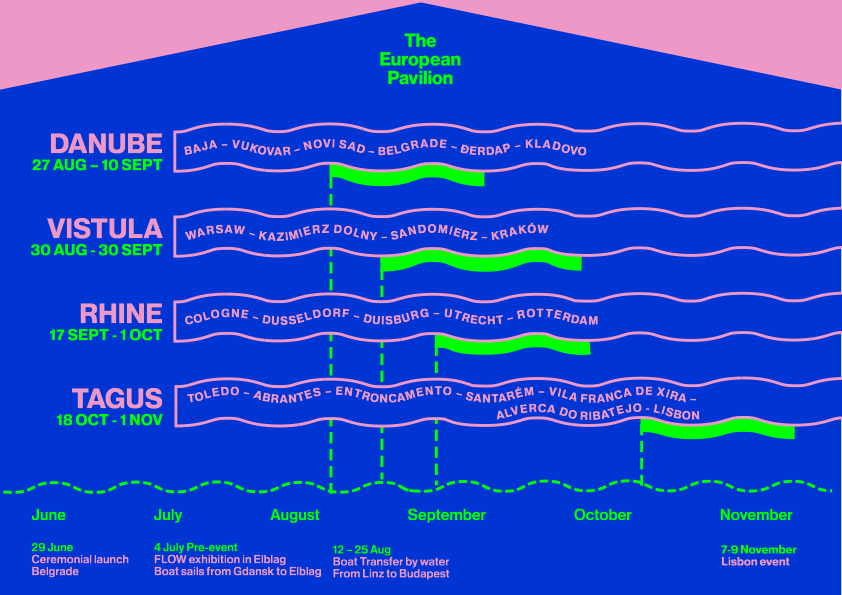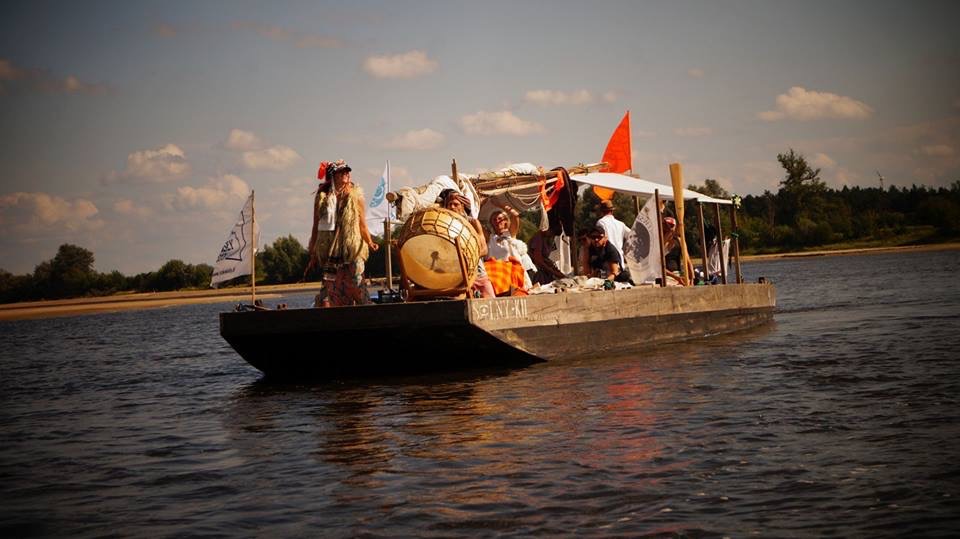Liquid becomings, the project selected in this year’s European Pavilion, takes the form of a travelling pavilion in which four teams of artists and curators will travel by boat along four European rivers: the Rhine, the Danube, the Vistula, and the Tagus in search of answers to the question of what the future of Europe will be like and how we can shape it together.
The European Pavilion 2024: Liquid Becomings
Initiated by the European Cultural Foundation in 2020, the European Pavilion is a pan-European and multidisciplinary artistic programme that puts Europe and its future at the forefront. The Pavilion is organised every two years, and its programme is selected through a competition open to cultural organisations from all over Europe. This year, it was the team of curators composed of: Bojan Đorđev, Laura Kalauz, Maria Magdalena Kozłowska, Siniša Ilić, Alfredo Martins, Annette Mees, Naomi Russell and Olga Uzikaeva, Agnieszka Brzezanska, Ewa Ciepielewska and NGOs led by Stichting Passaros | espaço agora now that presented the best project, Liquid becomings.
Liquid becomings is an unconventional undertaking, departing from the form of a traditional pavilion. Four crews consisting of 32 artists from 17 countries will go on four voyages on the great European rivers: the Danube, Rhine, Tagus, and Vistula. In total, they will visit 11 countries and cover 1,394 kilometres of sailing. The first crew set off on 27 August 2024 from Baja, a town on the Danube. During their journeys, the artists will meet with local communities, offering various workshops, discussions, and performances that will aim not only to build civil society ties, but also to search for new ways to be in Europe and co-create its future. The last of the voyages will end on 1 November 2024.
All crews will meet between 7 and 9 November 2024 in Lisbon during an art festival located in the former Lisbon port of Beato and the Quinta Alegre socio-cultural complex. The project participants will talk about their voyage experiences and present their discoveries to the public.



Graphic: Jan Tomza Osiecki
“I’m in love with the wild Vistula” – Polish part of the journey
The Polish part of the journey will begin in Warsaw on 31 August 2024 during an open meeting with the crew and curators of the Liquid Becomings Pavilion, which will take place at the Museum of Modern Art on Pańska Street. The meeting will be complemented by a discussion about the book “Bodies of Water” by Astrida Neimanis led by Zofia Jakubowicz-Prokop and an evening performance by Maria Toboła on the Saska Beach at 7:00 p.m.
The crew will set off on 1 September from the Czerniakowski Port on a boat called “Flow”. The voyage will be attended by seven Polish artists led by three curators of the project: Agnieszka Brzeżańska, Ewa Ciepielewska, and Maria Magdalena Kozłowska. The crew will focus on artistic exploration around the topics of ecology, river renaturation, and community, which they will also actively co-create by organising conversations around a campfire along the route of their journey. Their activities will be accompanied by the slogan “I’m in love with the wild Vistula!”.
The artists will stop in Kazimierz Dolny (17-19 September), where they will invite the local community to take part in a bonfire, concerts, and performances. There are also plans for stops in Solec and Sandomierz, where meetings with local artists and boat builders will take place. The journey along the Vistula will end in Kraków (27-29 September), and the crew will actively participate in the celebrations of the Days of Kraków 2024 in cooperation with Cricoteka. The planned activities include a guided tour of Jerzy Bereś’s exhibition, a meeting with Michał Piasecki about the book “Bodies of Water” by Astrida Niemanis, a cruise on the Vistula with a guide Mateusz Niemiec from the Museum of Kraków, a panel by Cecylia Malik and the Siostry Rzeki collective, and a Deep Listening Concert performed by Rafał Mazur.
“The Vistula, the most important river in Poland, not only divides our country into two parts, but also connects us thanks to the bridges built between its banks. This time, the bridge connecting different communities and enabling mutual understanding will be art, which plays a key role in a dynamically changing world. Thanks to the stops between Warsaw and Kraków and numerous accompanying events, it will be possible to literally “immerse yourself” in the cultural offer of Liquid Becomings 2024!” – emphasises Olga Wysocka, director of the Adam Mickiewicz Institute.

Photo: Fundacja Flow
The Adam Mickiewicz Institute invites you to follow the project on social media!
Curators: Bojan Djordjev, Laura Kalauz, Siniša Ilić, Alfredo Martins, Annette Mees, Naomi Russell and Olga Uzikaeva, Maria Magdalena Kozłowska with Agnieszka Brzezańska and Ewa Ciepielewska
espaço agora now in collaboration with Teatro Meia Volta, MS Fusion, United Artist Labor, FLOW.
Artists: Alicja Wysocka, Bogdan Djukanović, Carola Uehlken, Elodie Olson-Coons, Elina Rodrigue, Flavia Barbosa Pinheiro, Gonçalo M. Tavares, Gosia Kępa, Isabel Soany, Jaka Škapin, Keli Freitas, Katarzyna Popović, Leila Chakroun, Małgorzata Kuciewicz, Małgorzata Markiewicz, Marija Balubdžić, Marta Niedbal, Martin Schick, Mette Sterre, Neda Kovinić, Niel de Vries, Paula Diogo, Pio Sebastian Torroja, Patryk Zakrocki, Romuald Krezel, Saskia Tamara Kaiser, Sophie Thun, Wiktor Vejvoda
Production and technical team: Lucy Atkinson, Ricardo Costa, Dragana Jovović, Aleksander Rakezić, Mariana Rolim, Ana Raquel Rodrigues, Ana Paula Teixiera, Hannah Tully
Boats and Captains:
MS-Fusion: Rainer Prohaska, Hanna Priemetzhofer, Florian Sorgo
FLOW: Piotr Jedynasiak
Content marketing: Mandy Martinez
Social Media Manager: Flávia Ruas
Films: Dušan Čavić + Dušan Šaponja / Marka Žvaka
Podcasts: Donald Hyslop for Resonance FM
Spokesperson: Heidi Vandamme
Spokesperson in Belgrade: Monika Husar / KomunikArt
Spokesperson in Lisbon: Cláudia Duarte / This is Ground Control
The project was commissioned by the European Cultural Foundation with additional support from the Calouste Gulbenkian Foundation, DGArtes and República Portuguesa, the Embassy of the Kingdom of the Netherlands in Belgrade, the Founding Friends of espaço agora now, the Adam Mickiewicz Institute with funding from the Ministry of Culture and National Heritage, Quinta Alegre, and Resonance FM.

